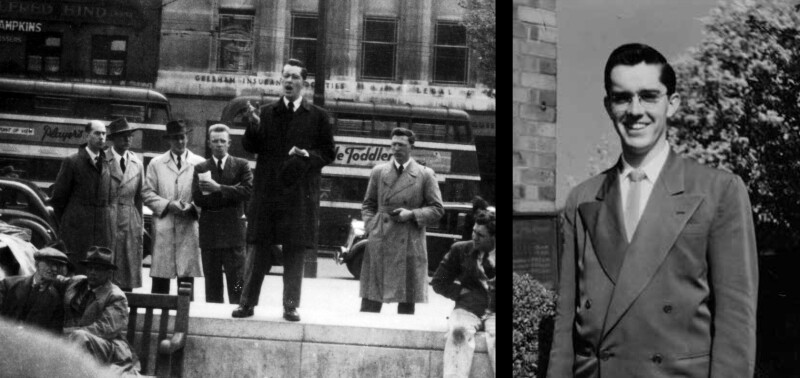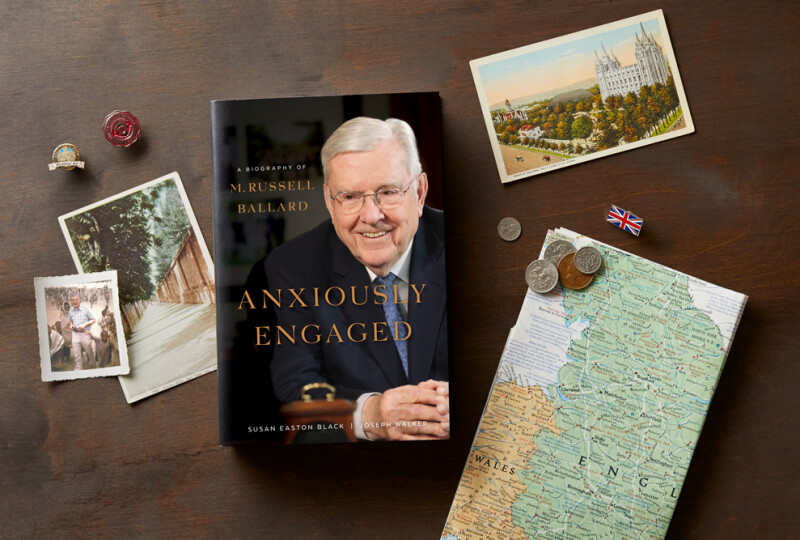A New Assignment
[For the second area of his mission], Elder Ballard learned that he was being transferred to Hucknall, a market town nestled in the Trent Valley just seven miles northwest of Nottingham. The town was certainly not as imposing as Nottingham but was known for its knitting, coal mining, market square, and the St. Mary Magdalene parish church.
Elder Ballard was assigned to labor with Elder Thacker, a fun-loving, hardworking missionary.…
As the work blossomed in the Hucknall countryside, Elder Ballard and Elder Thacker purchased a tandem bike. It was an unusual purchase—most missionaries just walked or took public transportation from place to place. But they believed that with a bike they could arrive faster to do more of the Lord’s work. The first day they “rode it in a cloud burst for 4 miles. We were soaking wet, but we saved 5 pence (bus fare) so it was worth it.”1 Two days later they crashed the tandem into rosebushes.2 The next day they parked the tandem and spoke in the market square. Elder Ballard wrote, “When we were singing for our first street meeting, a dog came up in front of us and started to howl. I started to laugh and so we went on to the speaking part of the meeting.”3
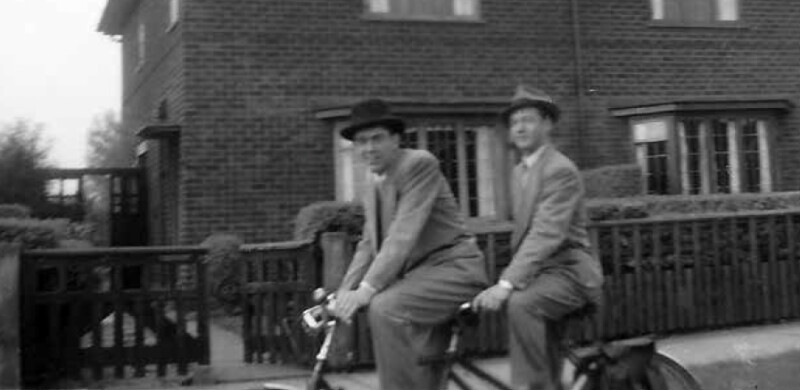
These adventures and more were captured in verse:
“Two Mormon Elders”
—President Ted Wright of the Hucknall Branch
Did I ever tell the story
Which now I’m telling you
About two Mormon Elders
Who came from Utah, too.
One was dark and handsome,
One was not a slacker,
One was known as Ballard,
And the other one was Thacker.
To get around the country
They both disdained to walk,
So they bought themselves a tandem,
At speed, they were the talk.
Till a fellow in an auto
From the driving seat did hop
Cause they passed him doing fifty
And he thought his car had stopped.
At singing on the market
They really did do well,
And the people here in Hucknall
Said the harmony was swell.
Till a certain mongrel puppy
Looking lost and heavy jowled
Sat up upon its haunches
And howled and howled and howled.
. . .
Now, all you folks who live here
Where dogs can run so free,
When they litter up your doorstep
Now please don’t make them flee.
And if you are so tempted
To give the dog a whacker,
Be sure it’s not the dog
That’s loved by Ballard and by Thacker.
Not everything was that merry for the young elders in Hucknall. On August 26, 1948, Elder Ballard wrote, “The roughest day tracting I have had since I came to the field. We had five doors slammed in succession, and I sure felt as if the world had come to an end.”4 It was not until two weeks later, on September 7, that he wrote:
“We can now see some of the fruits of our labors. Today a gentleman came up to us and said, ‘Are you two Mormon elders?’ We answered him, ‘Yes.’ He took one of our tracts and stated that he would contact the elders in Nottingham. He was a man who was really looking for the truth. He knew that none of the churches in England were the true church. He wanted to know about the LDS Church and the Book of Mormon.5”
On another occasion, Elder Ballard and his companion were walking through the famous hedgerows in Hucknall. Elder Ballard had the distinct impression to go and visit Sister Hayes. “It was late,” he said of the impression, “and we decided it was probably inappropriate to go visiting right then.” So, first thing in the morning he and his companion knocked on the door of the Hayes home. Sister Hayes, with tears in her eyes, greeted them and said, “Elders, thank you for coming. I have been praying all night that you would come.” She asked Elder Ballard and his companion to bless her daughter Kathleen, who was suffering from a high fever. “We did and immediately her fever broke,” Elder Ballard said.6
And so, the experiences of his mission changed from day to day. Whether tracting in the rain, holding street meetings or cottage meetings, suffering from stomachaches, teaching Relief Society, or listening to a man rant and rave about nothing, Elder Ballard knew that these were experiences he would never have known if he had not chosen to serve a mission.
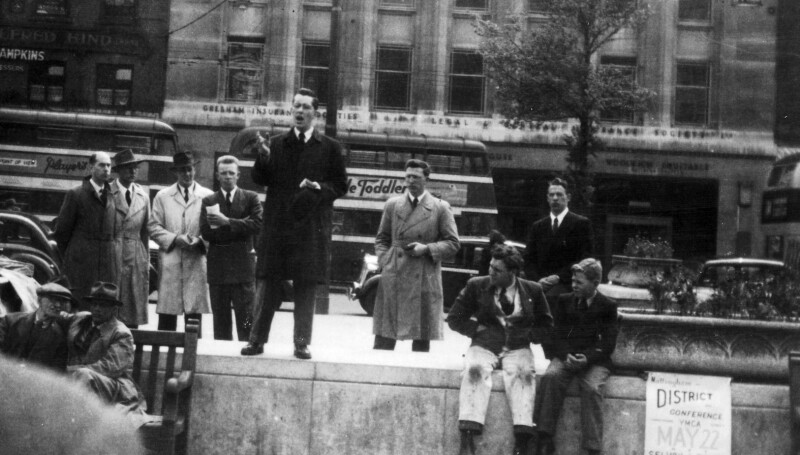
District President of the Nottingham District
President Boyer watched the young elder from Salt Lake City carefully and was impressed with Elder Ballard’s dedication to the work. On February 25, 1949, President Boyer wrote to him:
This is to notify you that you have been appointed to preside over the Nottingham District in the British Mission of The Church of Jesus Christ of Latter-day Saints.
It is your duty to preach the Gospel, to administer the ordinances thereof that pertain to your holy calling as occasion may require, and to preside over all the interests of the work of the Lord within your jurisdiction, subject to the counsel and direction of the President of the Mission. . . .
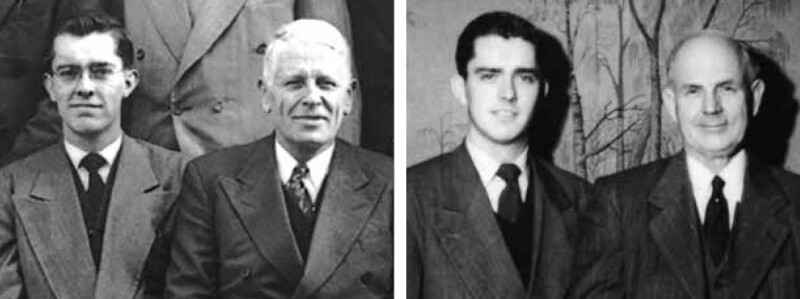
Of his new assignment, Elder Ballard wrote, “I received the shock of my life today when President Selvoy J. Boyer made me District President of the Nottingham District” with responsibility for thirty-two missionaries and the branches in the district.7 However, it was not in the busyness of being a district president that Elder Ballard received a convincing testimony of the restored gospel of Jesus Christ. It was in a quiet moment:
It had been a long day, not discouraging, but exhausting, filled with meetings and ministering that were associated with my assignment as a district president in Nottingham. The sun was about to set on another hectic Sunday in 1949. I had just concluded a successful street meeting with the other missionaries in the Nottingham District, during which we shared our message with passersby on Nottingham Square.
As I strolled along the Trent [riverbank], weary and yet happy and satisfied in the work, an overwhelming feeling of peace and understanding came over me. It was at that precise moment in time that I came to know that Jesus Christ knew me, that He loved me, and that He directed our missionary efforts in England and throughout the world. Of course, I’d always believed those things. They were part of the testimony I had shared just a couple of hours earlier. But somehow in that instant of what I realized was pure revelation, my belief turned into knowledge. I didn’t see any visions and I didn’t hear any voices, but I could not have known of Christ’s reality and divinity any more intensely had He stood before me and called out my name.
I had impressed upon my soul the fact that the Prophet Joseph Smith went into the grove near his home in Palmyra, New York, and there knelt and supplicated our Heavenly Father, wanting to know which of all the churches was true. The Father and the Son really did appear unto him, and the Father spoke to him, saying, “Joseph, this is my Beloved Son. Hear Him.” That the Savior of the world, our Redeemer, our Lord, our God, our very best friend, spoke to that young prophet on that occasion became a reality to me.8
Of that quiet moment, President Ballard said, “My entire life has been shaped by that sweet and tender missionary experience. From that day to the present, every significant decision I have made has been influenced by my knowledge of the Savior and of the reality of the restoration of His gospel.”9
Notes
- M. Russell Ballard Journal, August 7, 1948.
- MRB Journal, August 9, 1948.
- MRB Journal, August 10, 1948.
- MRB Journal, August 26, 1948.
- MRB Journal, September 7, 1948.
- M. Russell Ballard, “There Is Great Strength in the Women of the Church,” Preston England Temple Dedication, June 9, 1998.
- MRB Journal, February 26, 1949.
- M. Russell Ballard, Our Search for Happiness: An Invitation to Understand The Church of Jesus Christ of Latter-day Saints (Salt Lake City: Deseret Book, 1993), 7–8.
- Carolyn Hyde, On the Lord’s Errand: A Biography of Elder M. Russell Ballard of the Quorum of the Twelve Apostles (Salt Lake City: M. Russell Ballard, 2007), 139; M. Russell Ballard, “Success through Faith in Christ and Obedience,” Missionary Training Satellite Broadcast, August 28, 1998.

